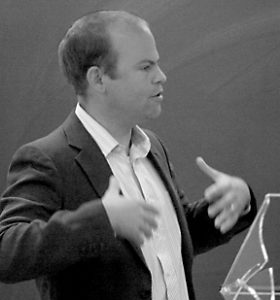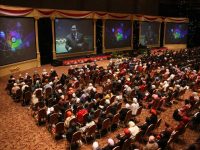Memo #68
Daromir Rudnyckyj – daromir [at] uvic.ca
 Is Islam compatible with capitalism? The recent uprisings in the Middle East have prompted renewed interest in this question. In his book, The Long Divergence, the eminent economist, Timur Kuran, suggests that Islam is to blame for the poor economic performance of Islamic countries. But today, a new breed of “spiritual reformers” sees Islam as a recipe for commercial success.
Is Islam compatible with capitalism? The recent uprisings in the Middle East have prompted renewed interest in this question. In his book, The Long Divergence, the eminent economist, Timur Kuran, suggests that Islam is to blame for the poor economic performance of Islamic countries. But today, a new breed of “spiritual reformers” sees Islam as a recipe for commercial success.
These reformers argue that Islam promotes the everyday practices that lead to economic success: hard work, self-discipline, and individual accountability. These reform movements demonstrate how devout Islamic practice can be conducive to capitalist success, representing what I call “spiritual economies.”
One such movement, ESQ training, started in Indonesia and has since spread throughout Indonesia, Malaysia, Singapore, and beyond. ESQ combines the measured prudence of Stephen Covey’s Seven Habits of Highly Effective People with an Islamic version of the theatrical oratory that is characteristic of American televangelists. ESQ is the brainchild of a charismatic former business executive, Ary Ginanjar, who instructs ESQ participants that the five pillars of Islam contain a formula for commercial success.
In these profoundly emotional ESQ sessions, the fourth pillar, the duty to fast during Ramadan, is recast as a model for self-control and individual accountability. The third pillar, the duty to give charity, is taken as divine sanction for “synergy” and exercising a “win-win” approach in both business transactions and relations with coworkers. Ginanjar describes the prophet Muhammad as a model CEO and participants are encouraged to emulate him as a successful trader and businessman. By early 2011 over one million people had participated in the program.
ESQ is just one example of the emerging spiritual economies throughout the Muslim world. Examples include diverse movements spawned by Fethullah Gülen in Turkey, the Eqyptian Amr Khaled, and Abdullah Gymnastiar in Indonesia. These initiatives demonstrate that Muslims are responding to the problem of underdevelopment by drawing on Islamic virtues. Far from seeing Islam as holding back economic development – as Kuran does in The Long Divergence – reformers today see the everyday practices of Islam as conducive to capitalist success.
About the Author:
Daromir Rudnyckyj – Assistant Professor of Pacific and Asian Studies at the University of Victoria.

Following in the footsteps of Benjamin Franklin, the Prophet Muhammad, and Stephen Covey, Ary Ginanjar offers his message that Islamic piety leads to commercial success.
Links:
- Spiritual Economies: Islam, Globalization, and the Afterlife of Development, 2010 (Book by Daromir Rudnyckyj)
- The Long Divergence: How Islamic Law Held Back the Middle East, 2010 (Book by Timur Kuran)
- Is Islam the Problem? New York Times, March 2011
- Islam and the Lagging Economies of the Arab World, The New Yorker, February 2011
- Spiritual Economies: Islam and Neoliberalism in Contemporary Indonesia, Journal of the Society of Cultural Anthropology, Volume 24, Issue 1, 2009
- More videos about ESQ
- ESQ in Saudi Arabia
Related Memos:
- Our other Memos about Indonesia, the Middle East, and Southeast Asia


